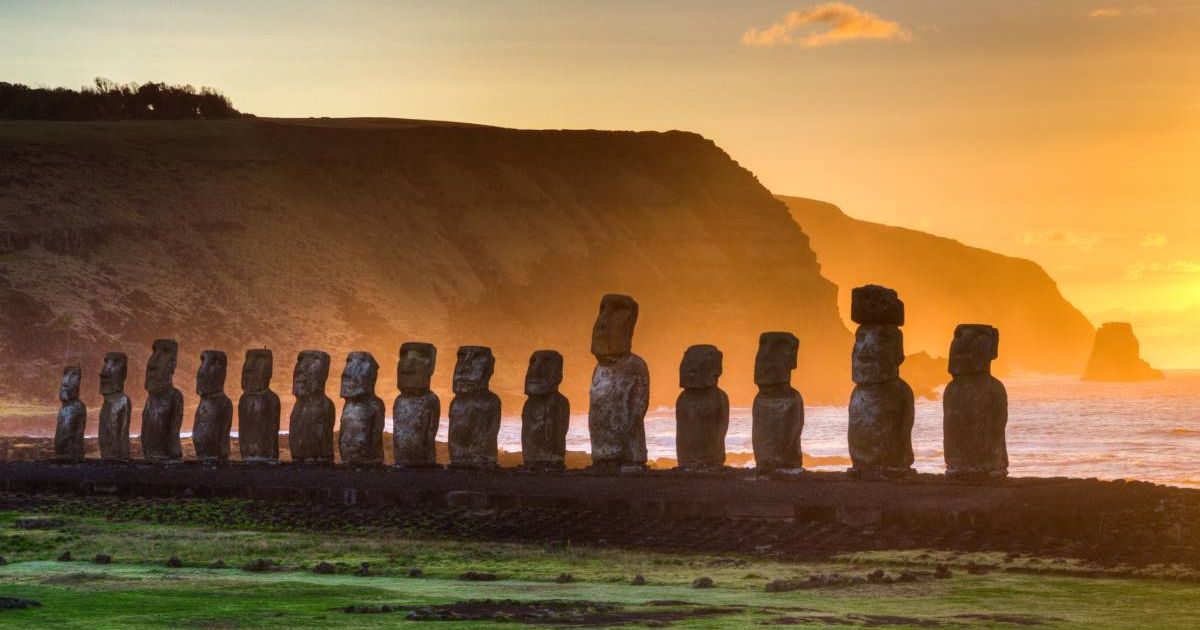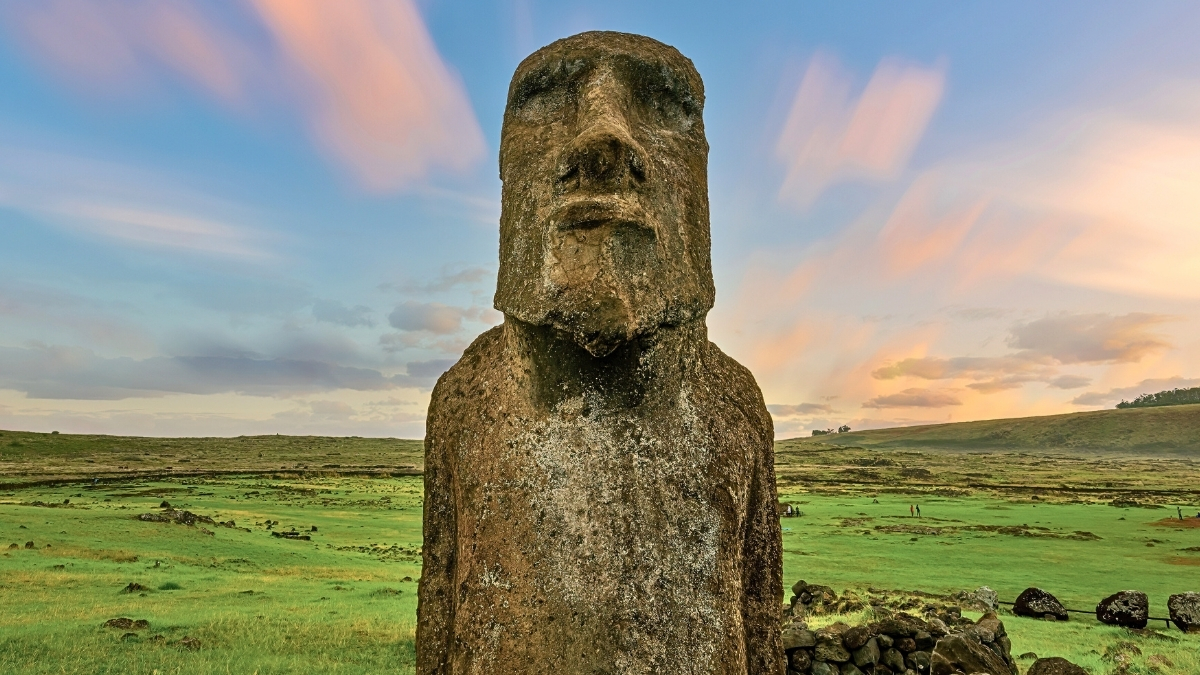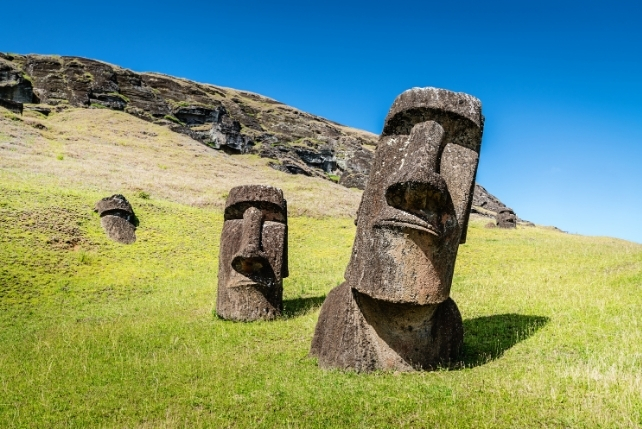Anthropology
Related: About this forumEaster Island Statue Construction Wasn't a Top-Down Affair
New research reveals moai creation was a decentralized process
By Jake Currie November 26, 2025

If anyone recently spotted advanced aircraft buzzing over Easter Island to surveil the mysterious moai statues, they weren’t UFOs. Instead, these drones belonged to terrestrial researchers, interested in answering a very down-to-earth question: Who was in charge of this megalithic endeavor?
Historic and archaeological investigations of the Rapa Nui people who carved the statues between 400 and 1,000 years ago suggest they lived in decentralized, close-knit family clans. However, many have assumed that their construction and transportation imply a more top-down hierarchical civilization, like the ancient Egyptians who built the pyramids. New research published in PLOS One suggests that, unlike the statues themselves, there was no big head at the top of the Rapa Nui directing the work.
Using more than 11,000 aerial images taken by drones of the site, Carl Lipo of Binghamton University and Terry Hunt of the University of Arizona constructed a detailed 3-D model of the primary quarry, Rano Raraku. This model showed a hodgepodge of moai carved from multiple sites with statues in various stages of completion. Analysis of the statues remaining in the quarry revealed a variety of carving types as well. Rather than a centralized, top-down construction effort, the authors say, it more closely matches the works of a patchwork of freelancers consistent with their decentralized living arrangements.
This new finding is bolstered by Lipo and Hunt’s earlier research, which showed that it only takes a handful of humans to move these moai, around 18 in a test case. If anything, these studies make the construction and transportation of these magnificent megaliths an even more impressive achievement.
https://nautil.us/easter-island-statue-construction-wasnt-a-top-down-affair-1250397/
Judi Lynn
(164,067 posts)Carl studied a variety of possibilities to decipher the mystery of how the statues were moved to where they stand today in the island.
BY NEHA BHATIA
PUBLISHED 5 HOURS AGO

Iconic moai statues bathing in sunrise at Easter island (Representative Cover Image Source: Getty Images | Traumilichfabrik)
About 2,000 miles off the coast of Chile, Easter Island sits in the heart of South Pacific, carrying mysteries that have left archaeologists like Carl Lipo riddled. Fascinated by the “moai madness” that lingers in the island’s air, Lipo, hailing from Binghamton University, has been researching the iconic moai statues since decades. More than a thousand of these statues have been standing here for thousands of years, with their heads watching over the surrounding villages, the silent guardians of historic mountains. But the fact that the primitive people lugged along these hulking statues all the way to the mountains is a mystery no one has been able to solve yet. In a recent article published in The Conversation, Lipo documented the insights he gathered from his research and how the idea that the statues were likely connected with the island’s deforestation.

Easter Island's iconic moai statues (Representative Image Source: Getty Images | Lindrik)
At one point in time, more than 2,000 people resided on the island, per BBC. Somewhere between 1200 and 1700, the tribe carved out these breathtaking statues, whose weight ranges from 12 tons, going all the way up to 85 tons. Some statues were whipped up from volcanic ash while some were sculpted out of the base rocks of surrounding cliffs. History however failed to record how these people moved the gigantic statues without access to any advanced machinery or technology in the times gone by.

Moai stone statues in a valley in Rapa Nui island (Representative Cover Image Source: Getty Images | Piriya Photography)
This timeline of the island is punctuated with several dramatic episodes that Lipo studied to find clues. He explored a gamut of ideas. Were the statues dragged on top of tree logs or rollers, or were latched to the sledges and hauled to the meadows. Of all the possible scenarios, Lipo curated three attempts to decipher the mystery. In the first attempt, he used photographs. 1,686 photographs were captured by drones. Using these photos, he created a comprehensive 3D model of Rano Raraku, the volcanic crater where 95% of Rapa Nui’s moai were carved.

Moai stone statues in a valley in Rapa Nui island (Representative Image Source: Getty Images | Patricia Hamilton)
In the second attempt, Lipo explored the infamous “walking hypothesis.” In a study published in the Journal of Archaeological Sciences, he showed that the statues “walked” their way to the "ahus" where they are standing today. Lipo measured 62 statues abandoned along ancient roads. These measurements clearly suggested that the statues couldn’t have been moved “horizontally.” The only plausible explanation was that they were transported vertically, in other words, they “walked.”
More:
https://www.greenmatters.com/pn/the-mystery-of-the-iconic-moai-statues-was-likely-linked-to-an-episode-of-deforestation-on-easter-island
Judi Lynn
(164,067 posts)27 November 2025
By Carl Lipo, The Conversation

One of the moai statues for which Rapa Nui is famed. (f11photo/Getty Images)
Rapa Nui, also known as Easter Island, is often portrayed in popular culture as an enigma. The rationale is clear: The tiny, remote island in the Pacific features nearly 1,000 enormous statues – the moai.
The magnitude and number of these monuments defy easy explanation.
Since European ships first encountered these stone giants in the 18th century, outsiders have branded the island as fundamentally mysterious, possibly beyond archaeologists' ability to explain. This characteristic is part of what makes the island famous.

Rapa Nui (Easter Island) statues, partially buried
(Mlenny/E+/Getty Images)
Tour operators market the inexplicable. Documentaries promise unsolved puzzles. Popular books ask how "primitive people" could possibly move 70-ton megaliths.
Archaeological researchers have put forward various explanations for the statues, which were made between 1200 and 1700, but there remains no consensus.
For decades, experts offered plausible scenarios: powerful chiefs commanding workers, elite-controlled statue quarries, wooden sleds drawn by hundreds of islanders, roller systems, wooden rails and ceremonial pathway markers. Based on authoritative assertions and compelling narratives, these accounts are rarely connected to archaeological evidence.
More:
https://www.sciencealert.com/easter-islands-biggest-mysteries-finally-have-answers
GreenWave
(12,446 posts)And aren't the majority of them facing inland?